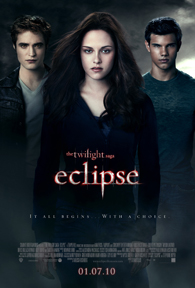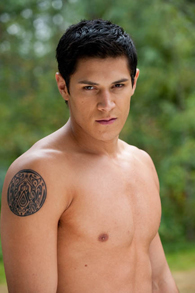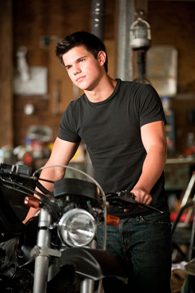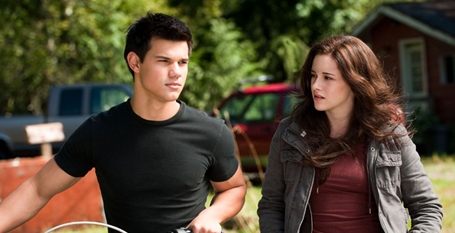
Bella is due to become a vampire in the near future, but will the still-human girl survive the continuing love contest between Jacob and Edward? Will she escape the wrath of Victoria, who is out for revenge? Also: Bella gets more voice over monologues, Edward glitters more, and Jacob continues to pose without his shirt when he’s not in cute giant puppy form!
Vernon says
By now, some of you may be aware of a rather amusing web marketing campaign in the US which attempted to sell the latest instalment of The Twilight Saga as a very gay movie. Even Entertainment Weekly got into the act. I’d hate to burst your bubble but the novels’ writer managed to insert for the conservative agenda, the trifecta of safe sex, abstinence, and fanatically monogamous vampires into Eclipse.
That’s not to say that The Twilight Saga is not without its joys. I noticed last year in New Moon that The Twilight Saga is very tolerable if you don’t watch it for the story, but rather for the impeccably timed lines that will either provoke shrieks if you’re a fan or groans if you aren’t.
This time round it appears that the cast, the producers, as well as the marketers of the film are becoming more aware of the camp potential of the series and how a parody of it might be more fun to do. Like I said, the marketers are in on the joke. Robert Pattinson has been in on the joke since he parodied Edward Cullen in How to Be, and the writers are in on the joke too.
The high point of Eclipse occurs in the flashback sequences that tell the backstories of Jasper and Rosalie Hale. There’s a trippy, campy, outrageously irreverent quality to their staging that makes them feel so fun. There’s a Civil War sequence set in a South ruled by sultry, lingerie clad, French-speaking vampires and a young colonel, that practically calls out to Francis Ford Coppola (via the infamous French plantation sequence in Apocalypse Now), and a revenge fantasy set in the Prohibition era that looks like Quentin Tarrantino fell in love with Hammer Horror.
It’s as though everyone involved knew how much more interesting the movie would have been if they just crossed a few lines – and for the first time in the series, they do share some of their demented ideas with the audience.
Whether you’re watching this as a straightforward PG teen romance, for the fanservice, or for its camp value, The Twilight Saga: Eclipse manages to deliver.
Enming says

To this reviewer The Twilight Saga's genealogy is less shared with that of centuries of folk myths and horror movies than with the "problem youth" pictures of the 50s and 60s. Don't believe me? Try this on for size: a dark, handsome stranger with troubled past enters a small town and falls for the Sheriff's daughter. Am I talking about Twilight? No, I am talking about The Wild One, the landmark biker gang picture with Marlon Brando. An alienated young man who hangs out in an old abandoned mansion to create the family he wanted? Is that something Edward Cullen might do, or Jim Stark in Rebel Without A Cause? What about a romance between two teenagers that leads to a war between two gangs, one of which comprises members of a minority ethnic group? Are we talking about Eclipse? No, I'm describing the landmark musical West Side Story.
The Twilight Saga is at best a third-rate copy of those movies, told with horror tropes, but without horror itself. The third instalment of this poorly constructed mythology at least makes broader attempts at horror under new director David Slade, but opening with a vampire attack scene trying to imitate in effect at least the opening of Jaws for suspense and failing, it only goes downhill from there.
Perhaps that has always been the central problem with The Twilight Saga for this reviewer, and it is twofold. Firstly, for all his tortured angst and claims that they are "monsters", Edward Cullen is pretty much the noblest person he can be within the confines of his own nature. Likewise for Jacob Black. Both of whom deny their appetites for Bella Swan with a restraint that would be the envy of saints while they make their proclamations of love. The word "monster" has its root in the Latin word for "warning" (monere), and therefore monstrosity is a quality that warns of a deeper malaise within a character. Fangs, claws and pale glittery skin do not monstrosity make.

In fact, any of the above "problem youth" pictures feature characters more tormented and monstrous than Edward and Jacob. Secondly, Bella Swan is one of the blankest heroines I can think about in literary history, if as Stephenie Meyer herself has admitted that Edward Cullen is inspired by Fitzwilliam Darcy and Edward Rochester (from Pride and Prejudice and Jane Eyre respectively for those that fell asleep in literature class), Bella has neither the inner fortitude of Jane Eyre, or the spunk of Elizabeth Bennett. The Twilight Saga's success formula is obvious: Bella Swan is a blank slate that the moon-eyed teenagers that frequent the movies and read the books can project themselves onto and use her as a platform to desire one of two Knights in Shining Armour (or in this case, Shiny Skin or Furry Skin). My talks with several teenagers and young women that love the series seem to confirm my suspicions: none of them like Bella, and they admit it.
The few moments this movie have going for it, especially a series of flashbacks by various characters about their pasts, seems to suggest a wider, deeper mythology that a clever revisionist filmmaker say the late Robert Altman might have fashioned into a different movie altogether: a witty commentary on Vampirism as a riff on Manifest Destiny and the instrumentality of Old World Chivalric values in its perpetuation, and the end product of that history being an anaemic youth population so alienated from the inevitabilities of loss and change, and therefore so removed from nature itself that its only choice for love and communion lies in the desire for oblivion.
Consensus
There are no surprises in Eclipse, which serves up plenty of fanservice, whether you’re a fan of Edward, Bella, or Jacob, or any permutation thereof. However, it is the minor characters who got the most fun in this instalment.

